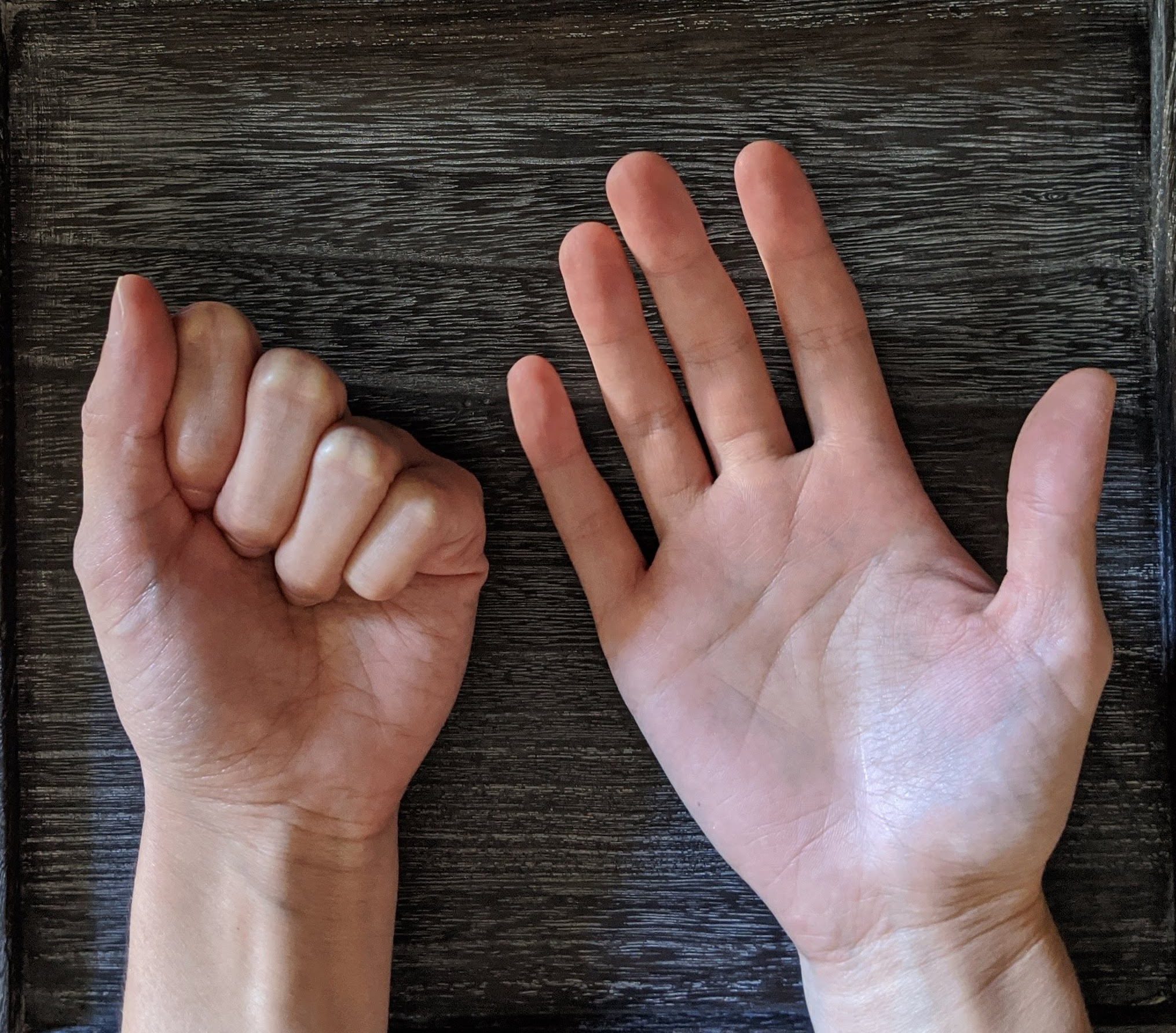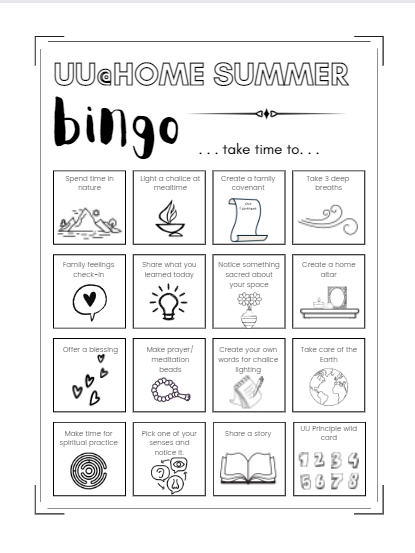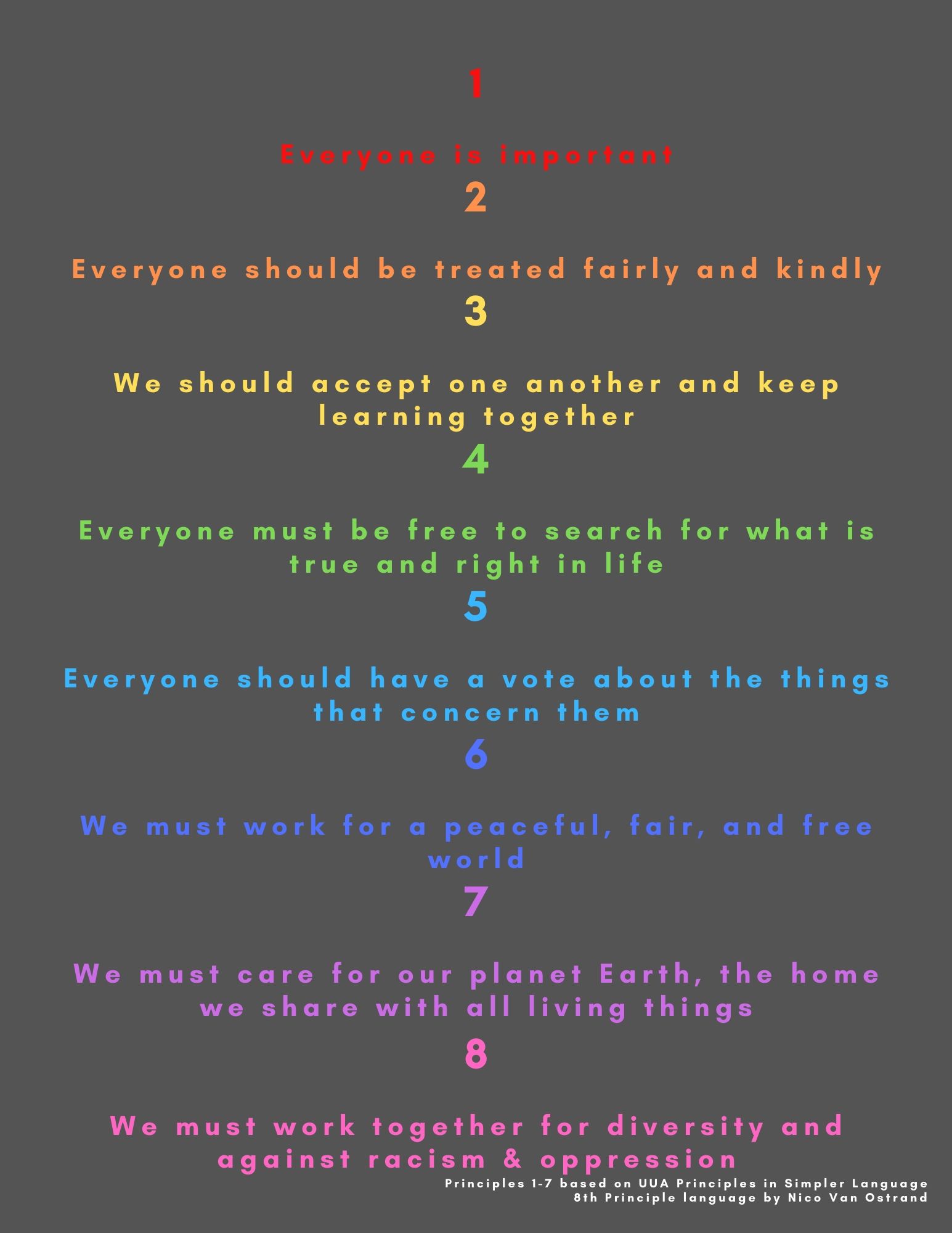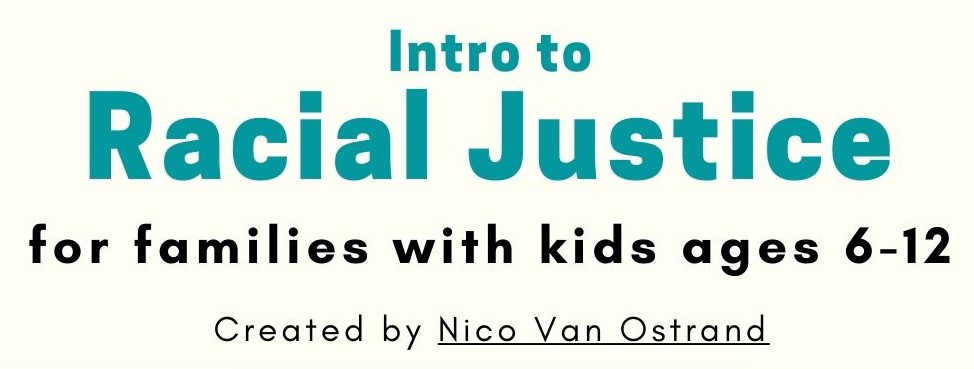UU@Home Summer Activity Guide
Posted on May 19, 2025
UU rituals and practices: every day for every age.
“…ritual is less about profound transitions and more about daily practices…They organize our emotional lives, prompt us to count our blessings along with our grievances, remind us to look up and out more often… They offer a sort of gentle time outside of time.”
-Courtney E. Martin on the onBeing blog from September 4, 2025
Creating “gentle time outside of time” is sometimes easier said than done. Life gets busy and making time to explore something new can often feel overwhelming! But starting a new ritual or practice doesn’t have to be an overly serious or complicated endeavor; we can hold space for grounding and centering in simple yet profound ways. We hope that this Summer Activity Guide helps you and your family members of all ages find a few fun and easy practices to weave into your everyday lives.
Ideas for how to use this guide:
-Pick one day each week to try one of the practices in this guide; write your reflections in the space provided. -Pick out four practices in a row that you would like to try this summer to get BINGO!
-Use this guide as a check-in sheet at the end of each day; which of these things did we do today? Which would we like to do tomorrow?
-Make it interactive: start a UU@Home group of all ages in your community (virtually or in-person) to check in on your progress this summer.
-Check the UU@Home Facebook page for tips and ways to interact.
Download the full guide below
Enjoying this content? Please consider making a donation to support this work. https://www.buymeacoffee.com/UUatHome
An Open Letter To Teachers in the Midst of Distance Learning
Posted on September 14, 2025
I see you—you are tired and frustrated and learning all the new tools that you need to teach the kids who may or may not be paying attention to you on the other end of the video call. You are worried about your students and their families, and you want nothing more than to be safely face-to-face with them, to see that they are okay, and learn together in the ways that are comfortable and familiar. But you can’t; so you are taking on the super-human mission of teaching kids that you cannot see and whose needs you cannot properly assess or dream of meeting… all while your heart is breaking. I see you.
So when I overhear you say, “this is the worst day of my life…I can’t do this…” to a virtual class full of kids as you struggle mightily with learning how to reach and teach these students with all-new glitchy tech tools during a pandemic, I hear you, I see you… and I believe you. This is kind of the worst.
My deepest hope and prayer is that your day was not made worse by imagining that parents like me are expecting miracles from you; I know I’m not. I promise you that I know that you are not responsible for this pandemic, and that things will not go back to the way they were before, if only you could get Flipgrid to start working. You are doing what you can.
Hear me when I say that your worth as a teacher, as a human, is not dependent on how well the technology is working today.
And parents, I see you, too. You are frustrated as you are trying to work or find work and put food on the table and keep everyone healthy (wash your hands!), all while keeping your kids on task, perhaps even striving for pre-pandemic standards. The school schedules and expectations are unclear at best, and you are running tech support for your frustrated, anxious kiddos, who are trying their hardest, but miss their friends like crazy. And it is too much. It just is.
Hear me when I say that your worth as a parent, as a human, is not dependent on how well you can get your child’s technology to work, or how many assignments they complete perfectly and on-time. You are trying your best.
This is so hard; so very hard. And none of us is going to get through this alone-we were never meant to do any of this alone. We need to be in this together, even if we are 6 feet (and so much more) apart. And, TBH, I have lost my cool more times than I am comfortable admitting after less than a week of distance learning.
So, going forward, here are my promises to you- the teachers, parents, and kids, all trying their hardest to survive this pandemic :
I promise to try to remember to be gentle with myself and others; and though there will be days that it will be beyond my ability, I will work my hardest to model patience and grace and remember that learning, for all of us, is messy and frustrating and joyful and hard.
I promise to not fall into the trap of making learning about achievement and competition; but about curiosity, humility, community, and wonder.
I promise to remember that learning is about all of us, not just *my* kids.
I promise to try to remember to gracefully step away from how we’ve always done it or how we planned it when changing course is called for. (Reader, I love planning. This is a hard one for me),
I promise to choose curiosity when faced with something new or scary, or with something that just doesn’t seem to make sense to me.
I promise to help my children develop the skills to push through the frustration that comes with learning something new, and the wisdom to know when to step away from something that is just too much. (Yes, there will be days when I won’t make my kids finish their homework).
Most importantly, I promise to vote and to keep screaming for more adequate funding for our public schools. Because funding matters, y’all. I’ve said it a million times and I’ll say it again: if you say you love education, if you say you love our teachers, then you should be raising holy hell every time you are reminded that our schools are being funded, in part, by box tops.
Teachers, you’ve got this. Parents, we’ve got this…and some days we won’t have this. And that is okay, too. On those days, may we remember that our kids are listening… so let us choose only the best swear words when we curse whatever technology that happens to be failing us. Because, as my 6th grade English teacher taught me many years ago, “sometimes ‘gee golly gosh’ just doesn’t cut it.”
Decenter and Receive
Posted on June 23, 2025
 The question of how to address racial justice with kids is huge in my mind, at all times but especially now as the marathon of justice work continues. It is clear to me that the seven (+ proposed 8th) Unitarian Universalist Principles call us to include children in racial justice work.
The question of how to address racial justice with kids is huge in my mind, at all times but especially now as the marathon of justice work continues. It is clear to me that the seven (+ proposed 8th) Unitarian Universalist Principles call us to include children in racial justice work.
(I must note again that the ability to choose whether or not to talk about racial justice — as an idea and not an experience — is a privilege. Many BIPOC families have been addressing racial justice with their kids for years out of necessity.)
We know that racial justice is complex. And huge. And daunting. So too are other questions we expect UU children to consider: What do you believe about God? Why do good/bad things happen? What does Unitarian Universalism call you to do?
UU children explore those questions through stories, reflection, and community, supported by UU Principles.
Approach racial justice in the same way. As you share stories, reflect, and turn to the Principles together, add the practice of decentering.
The practice of decentering is particularly relevant to White people and IPOC as we affirm loudly and unflinchingly the absolute truth that Black lives matter. This is a practice we are called to by the fourth Principle: “A free and responsible search for truth and meaning.”
Try this with your kids at home. Pick a story to share together. Before you begin, follow this short meditation.
Get comfortable in your space and take a few deep breaths.
Hold both hands out in front of you, palms up. Imagine that you are holding everything that you know in your two hands. Feel the weight of everything that you know pressing against your palms.
Sit with that weight for a moment.
When you are ready, carefully gather everything that you know into one of your hands, leaving the other empty. Close the fingers of your one hand around everything that you know. Keep it safe there.
Feel the emptiness of your other hand, palm open, ready to receive this new story.
Invite your child to keep their hands in that position — one holding everything they know and the other open to receive — as you share the story together.
When you’re finished taking in the story, take another deep breath together. Invite your child to silently notice their reaction to the story, and to hold that reaction inside for a moment.
Then, answer together: How does this story feel, received in your open hand?
It takes practice to set aside your own thoughts and emotions. It takes practice to listen deeply not as a prerequisite to response but as a means to connect with diverse and beautiful truths. This practice is sacred. Do it together, do it often.
Support this and other anti-racist UU work here.
The 8th Principle
Posted on June 18, 2025
In 2013, Paula Cole Jones and Bruce Pollack-Johnson proposed an 8th Principle* which reads:
“We, the member congregations of the Unitarian Universalist Association, covenant to affirm and promote: journeying toward spiritual wholeness by working to build a diverse multicultural Beloved Community by our actions that accountably dismantle racism and other oppressions in ourselves and our institutions.”
This proposed 8th Principle has not yet been officially ratified by the UUA, but that does not mean it has no place in your UU home practices. I’ve edited the language — but stayed as close to the original message as possible — in hopes of making this Principle more accessible, especially for kids.
My edited version reads:
“We must work together for diversity and against racism & oppression.”
As you turn to the 7 Principles to guide your family’s UU practices, consider adding this 8th Principle to the set. Begin by considering the language and message of this Principle. Talk with your family about what it means, and why it is necessary. Make a list of some ways you can follow this Principle at home and in your wider UU community. Find out what your congregation is doing to promote this Principle.
Begin your practice of turning to the 8 Principles to guide your family’s UU home practices today.
*American UUs currently affirm and promote 7 Principles, but our UU siblings in the Philippines already have 8 Principles. Read more about their Principles here.
Download the 8 Principles poster PDF here.
Support this and other anti-racist UU work financially here.
Intro to Race for Kids
Posted on June 17, 2025
I created Intro to Race for Kids Ages 6-12 following the murder of George Floyd by Minneapolis police. Several parents said that they had no idea how to talk to their kids about what had happened, and so they simply didn’t.
The ability to avoid talking about race and racism is a huge privilege, and one I encourage families to inspect. I know these conversations are daunting, and I hope that these stories and activities help families begin the long-overdue learning about race and racism.
Here’s how you can use this resource alongside other UU families or with families in your wider community.
Along with other families, commit to utilizing this resource for the next four weeks. During that time, schedule weekly meetings just for parents. Begin by creating a covenant: What do we agree to do so we can grow together and support each other, wherever we each are individually in the learning process? This covenant will support the group as you challenge each other, make mistakes, and begin this nonlinear process together.
The resource will ask you to create a Question Wall for your family at home. Create a group question wall for this parent group as well. Use this space to lift up difficult questions — questions your children bring up and questions that you hold during this learning. For questions that have answers but may require some research, consider assigning volunteers to research briefly and share back next week (decide how you will share back after the final week). These volunteers must commit to center BIPOC voices as they search for answers.
At each meeting, consider using these questions to guide your conversation.
- What are you bringing with you into this space?
- How do you feel this week’s activities went?
- What questions do you have for the question wall?
- Who is willing to research applicable questions?
- What learning did you notice in yourself this week?
- What support do you need from your peers?
Talking about race with kids is hard. But committing to doing it alongside other families and building a support system with them will make it just a little easier.
Did you find this parent guide and the Intro to Race for Kids resource useful? Support this and future work by sharing widely and/or offering financial support here.








